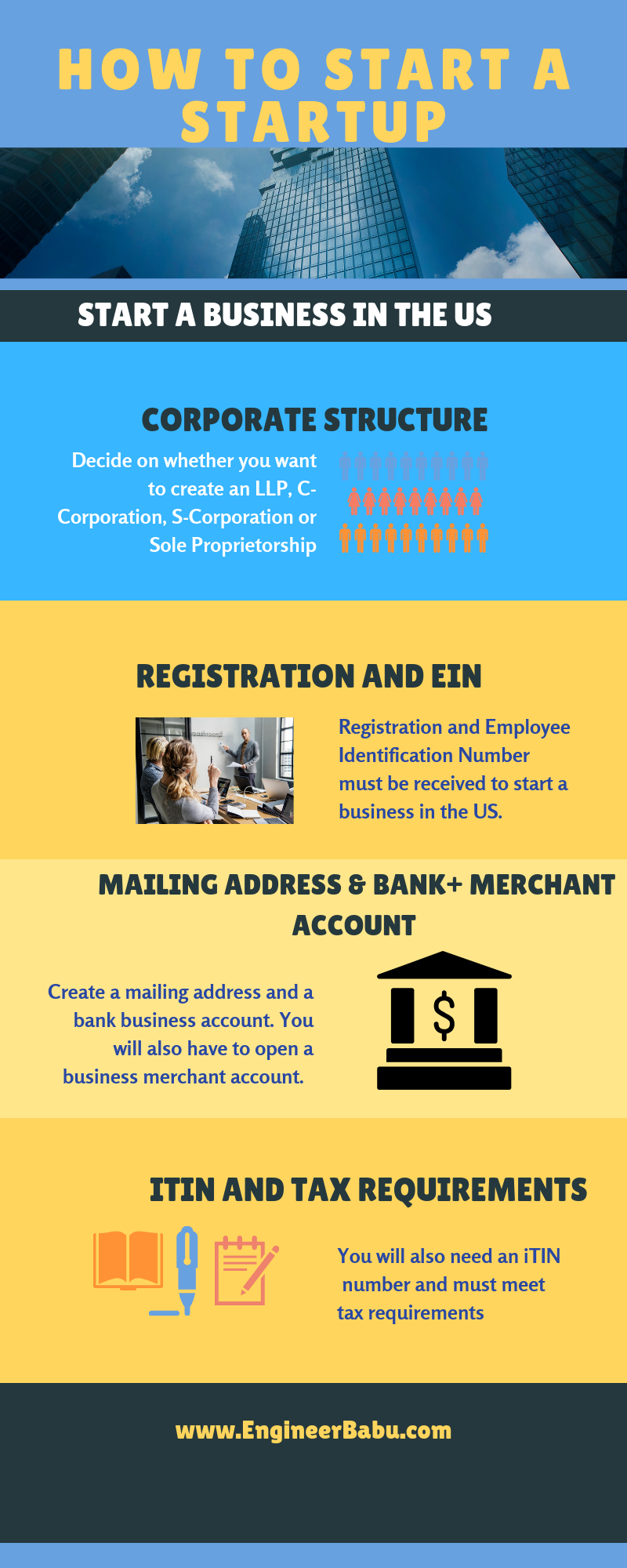Looking to start a company in the United States? Are you in search of the perfect startup opportunity?
How easy or hard is it to open a business in the US?
What are the basic procedures involved?
What strategies can help you most?
All this and more will be answered today in this blog, where we cover how you can start your very own startup in the United States!

Failure can easily be the stepping stone to success, especially in the business world. For a game-changing startup, a lot of aspects need to be looked into. There are so many things you need to watch out for, too.
But first of all, let’s see what the advantages of successful startup companies in the US are. By founding a US-based company, here are the advantages you will get:
- You can open a business bank account in the United States.
- You can access US payment processing accounts like Stripe, Amazon FA and others.
- You’ll enter the profitable US market.
- You’ll also brand your startup on a global scale for US-based and international customers.
If you’re a non-US resident or non-US citizen, starting a business in the USA for foreigners is easier than you think. It’s not crucial to be a citizen or an American resident or even hold a green card to start a corporation or an LLC in the United States.
Steps To Start Your Company In USA
Walt Disney remarked that the best “way to get started is to quit talking and start doing.” So let’s dive deep into how to start a startup in the United States.

Step#1: Choosing Your Company’s Structure
Starting a US-based startup as a foreigner requires hard work and preparation. However, it is easy to register your company and open a business. The primary step here is to decide which structure your company will opt for. Most foreign nationals choose C-corporations, as these expand through unlimited stock and are attractive for external investors.
The downside? Profits are taxed twice as dividends to shareholders and at corporate levels. The advantages for corporate shareholders include lower dividend rates.
As long as the US company is not holding real estate, the corporate parent company won’t be shelling out capital gains while selling the startup. The structure, further, shields business owners from direct tax scrutiny.
However, for this shield, owners are doubly taxed. However, salaries, pensions, and other expenses can be used to lower corporate income and eliminate double taxation. A limited partnership is the best business structure based on the particulars of tax laws. A limited partnership offers limited liability for partners without management control. Further, profits are passed onto members.
Therefore, you need to take care in choosing the right business structure, for it influences everything from everyday operations to taxes, assets risks and much more.
Limited Liability Companies
These are the best choice for residents, as well as non-residents. LLCs are, in fact, the most common business type in the US, especially for non-residents.
Pros:
- The key benefit of an LLC is that it protects personal assets from lawsuits and business debts.
- LLCs also offer simpler, and more affordable structures for taxation purposes.
- This is because it follows a pass-through taxation system, whereby earnings pass through to personal income taxes and you save on filing costs.
- Especially if you’re starting a startup alone, and making less than USD 80K annually, this is the corporate structure you should choose.
C-Corporations
This one’s a strictly non-resident choice. US residents should not opt for C-Corporations. The reason why it makes sense for foreigners looking to start a US-based business is that it attracts investment opportunities and offers shares for the company. So, what’s the catch? Double taxation is the pitfall of forming a C-Corporation. It’s still a great option for these reasons:
Pros:
- C-corporations work out better for investors, as investors hold shares without bothering about tax issues until they sell later down the road.
- Those who seek to transfer shares to investors or company employees easily should definitely opt for this company structure.
S-Corporations
For US residents, this corporate structure is the best choice. It is an eligible domestic corporation that avoids double taxation, unlike C-Corporations. This type of company is not permitted for foreigners. However, for American residents, it is a perfect choice.
Pros:
- For those making more than USD 80K per year, S-Corporations are better as a tax-saving device. With S-Corporations, self-employment taxes can be avoided saving 15.3% of the income.
- The difference between LLCs and S-Corps is the pass-through tax.
- For LLCs, taxation is either at the federal level for sole proprietors or partnerships for multiple levels. Money gained or lost by the LLC passes onto personal tax return and is taxed there.
- With S-Corporations, salaries can be disbursed as a tax saving device. However, non-residents cannot be shareholders for S-corps.
Sole Proprietorship
Sole proprietors are the simplest business type and do not require formal filings. Businesses are automatically considered as a sole proprietorship when business activities are undertaken, but no registration is carried out. The only issue? You’ll be liable for all business matters, which means your business assets and liabilities are not separate from personal assets and liabilities. So, if there are business debts or obligations, it becomes your personal responsibility to deal with these.
Know the Rules!
For US residents, doing business in any other state outside of the state where there is actual presence means you have to register the business in the home state, too.
You need to let home states know you are operating foreign LLCs in their state, so you will end up paying filing and annual fees in both the states.
To avoid this, residents should form LLCs or S-corporations where business is physically conducted. For non-US residents, check if the state allows the following:
- Non-US citizenship requirements
- No member listings with the state
- Cheaper annual report fees
- Foreigner friendly laws
For example, foreigners can set up an LLC in Wyoming, USA and live anywhere in the world, while operating a business here. If your company operates in more than one US state, as a foreigner, you can incorporate the company in any of the states, but registration is essential to do business in other states.
This involves a process known as Foreigner Qualification. An LLC or C-corporation formed in one state and incorporated there must qualify as a foreign corporation in another do legally do business there.
So, it’s not as simple as it looks!
Step#2: Register Your Company
What’s the next step? Well, the company’s business should determine its location ideally. If one state dominates its market-share, it is better to incorporate the company there. Forms and other requirements vary across states. However, the general procedure is as follows:
- Company principals choose a unique name.
- They select registered agents to receive legal papers for the company. In certain states, a company with a physical address can serve as its own agent. But in other states, like California, this is now allowed.
- Companies then fill out a certificate of incorporation which contains:
– corporate name
– name and address of the registered agent
– the total amount and par value of shares the corporation is authorized to issue
– name and mailing address of incorporators.
Once the business is incorporated, a report is filed and a franchise tax is paid.
LLCs, as well as corporations, must have a registered agent with a physical address and not a postal office box, during normal business hours to receive critical business documents.
Registered Agents receive legal documents and official papers on behalf of the company. They must be located in a state where one registers.
Registered agent services are generally preferred, as you cannot use a mail forwarding or PO box service. Additionally, the registered agent’s address cannot be your business’s legal address or even mailing address.
Here are the requirements for registered agents:
- Must be physically located in the state of incorporation/formation
- Must be present at the address during business hours.
- Must have their name and address kept current with the state.
- Must be okay with their address becoming public and searchable.
Shop for registered agents, most of whom levy fees from USD 50 to 100 annually. This is a recurring fee which must be paid every year. How long it takes to register the LLC or corporation is based on the state where the business is formed.
It can take anywhere from a single business day to 4 weeks, based on which state to form the business entity and how long the Secretary of State processes your request.
Patience may be a virtue, but speed is of the essence in the startup industry. So make sure you apply ASAP.
Step #3 Form an EIN/Employee Identification Number
To hire workers, open bank accounts, pay your taxes or get a business license, you need an Employee Identification Number.
Apply for this number with the IRS directly online, for best results, provided your company’s principal officer has obtained a separate TIN or Taxpayer Identification Number for the agency.
When the TIN is missing, you need to apply by mail or fax and enter “foreign or none” for the TIN number. EIN is also known as the Tax ID number and is issued by America’s IRS to identify the business. It’s like a social security number for your business.
Whether you want to start a business, open an account, apply for permits or licenses, hire employees and file taxes, you need an EIN. US citizens with social security numbers can apply online for EIN.
Step#4: Get a US-Based Mailing Address
Most American banks require a US mailing or residential address for opening a bank account. Your company or startup can also provide a business address for this purpose. US-based mail forwarding services can help you if you don’t have the physical presence in the US.
These service providers scan regular mail and send you emails which can then be forwarded to international addresses. Additionally, Form 1583 needs to be submitted from the USPS to authorize services to open your mail. For forwarding mail to the mailbox, you need to submit a change of address request to postal authorities.
Step#5: Open a US Business Bank Account
Once you receive your EIN, only then can you open a business bank account. To open a bank account, you need to personally visit the bank branch in the US. You can open a bank account for your business with your existing bank if you have a personal US-based bank account. Opt for leading players like BoA, Citibank or Wells Fargo for the best outcomes.
Make the US bank branch in your nation provide an in-person ID check required by the Patriot Act. Another option is to fly to the US and open a bank account in person, whereby you can even open a business bank account in another state than the one where the company is incorporated. You will need to provide a copy of articles of organization, ownership/operating agreements, passport and EIN letter from IRS for processing the bank account. Some banks also require TIN if the SSN is not there.
If you need a TIN, opt for ITIN services. Yet another option is to use online payment system Payoneer which allows the opening of a virtual US bank account to accept payments from US companies. It also offers prepaid MasterCard and the ability to accept ACH transfers from US companies.
Step#6: Open a Business Merchant Account for Accepting Customer Payments
The cost of opening a business merchant account is free. Once you receive the EIN, you can open a Stripe account or opt for other options like Authorize.net and Payoneer.com. Merchant services accounts can allow you to accept debit and credit card transactions from international US-based customers. PayPal requires an SSN number, so it’s a great option for US residents.
Step#7: Consider Insurance
Some businesses are statutorily required to make sure business and personal assets are protected through insurance. Further, the federal government requires businesses with employees to have unemployment, disability insurance, and workman’s compensation, besides additional insurance. Laws for insurance vary across states.
Step#8: Get an ITIN
For non-US residents without an SSN, an individual tax identification number is issued. ITIN is the personal tax ID number issued by IRS which requires individuals paying US taxes without SSN to fall into the system. All US banks require ITIN or SSN to open bank accounts. Additionally, ITIN is essential for PayPal or Stripe accounts, mortgage, and financing, apartment rental, complying with US federal tax for earning income in the US, filing tax returns if taxes are owned or even helping employers to get a job.
Step#9: Meet Tax Requirements
In this context, LLCs have a benefit because they are not directly taxed. For being taxed, you need a dependent agent which furthers your business in the US, as against administrative agents., along with a US-based office. When you work and pay taxes in your home country in other cases, tax treaties will circumvent the US rights to taxation. All foreigners with LLCs must file 5472 US tax returns for disclosure, though, even if they don’t own taxes. This is for companies with reportable transactions like the exchange of money or use of LLC properties by foreign owners/related parties. Annual fees should also be paid on time.
Strategies for Startups in the US
- To race past competitors, startups need to start out with confidence. Starting out is important, whether it’s writing the first line of code, sketching the product, registering the domain or designing the prototype.
- Besides this, you need to know how to sell differently or better, rather than just selling something new or revolutionary. Sam Walton of WalMart, for example, sold items you could find in a convenience store and made a success of it. Entrepreneurial innovators are few and far between. The key point is to start selling, even if your product is not the next big thing.
- Hire affordable talent. For this, remote workers could add enormous value.
- Find a co-founder who is as hardworking and passionate as you. Venture capitalists, angel investors or PE firms are likely to invest in startups with a co-founding team, rather than just an individual.
- Don’t focus on just cash, because quality solutions will earn you a steady income. Whether it’s funding, capital or business lending, or even pricing models, you need to move past the dollar bills and see the growth potential of your firm.
- Marketing is essential for selling your product in present times. Even the best products require marketing. A startup is about understanding what your customers want. Your business can either survive or thrive depending on receptivity to products or services.
Conclusion
Starting fast does not mean scaling fast. Have the tenacity, persistence, and grit to persevere in the face of obstacles. See each hurdle as a challenge and an opportunity for growth. As Tony Hsieh, the CEO of Zappos says: Chase the vision and not the cash; the cash will then end up following you!

